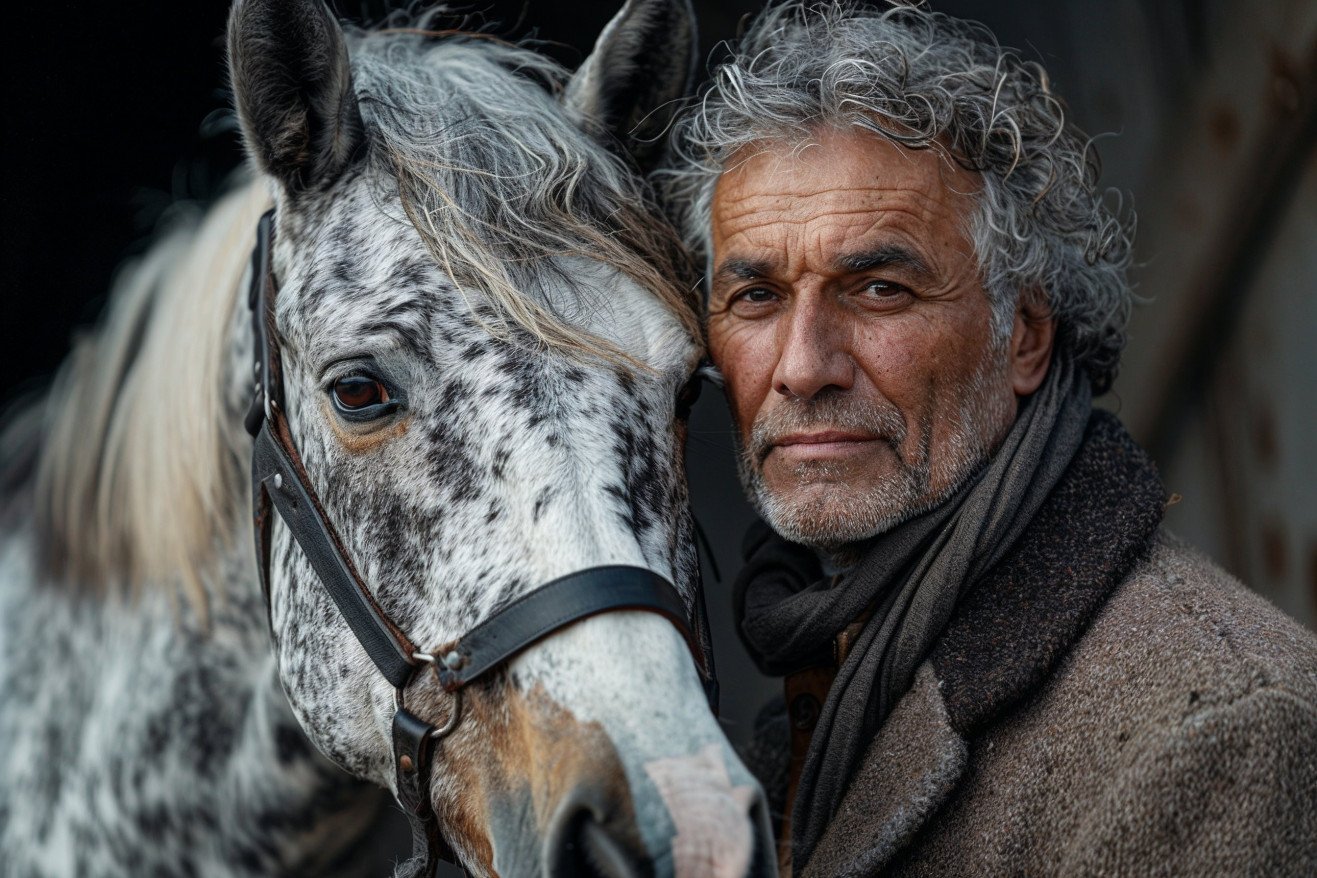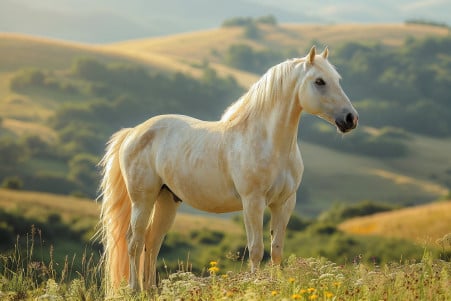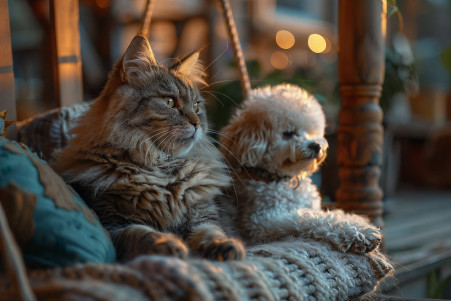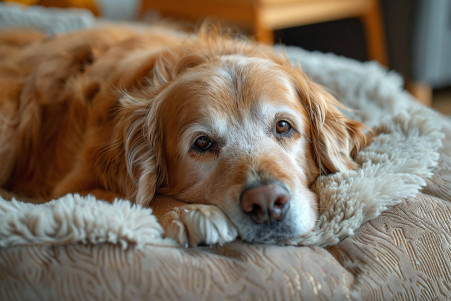Decoding Equine Aging: How Many Horse Years in a Human Year?
15 April 2024 • Updated 13 April 2024

If you've ever wondered how old your horse would be in human years, you're not alone. However, calculating horse years isn't as simple as it sounds. That's because horses and humans have different life stages and aging rates.
Horses mature much faster than humans and are considered adults by the time they're 2 years old. For the first two years of a horse's life, you can calculate their age in horse years by multiplying their age by 6.9. After that, a horse's age is the same as a human's age plus 5.
To better understand the details of how horses age, we can look to veterinary science, which has studied developmental milestones, life expectancy, and the many factors that can impact how long a horse lives. By learning about these biological facts, we can gain a better understanding of our animal friends' unique life spans and make sure they get the best care at every stage of life.
How many horse years are in a human year?
Breed Differences: How Horse Size and Type Affect Aging
A horse's breed is one of the most important factors that determines how it will age. As noted in a study published in PMC, smaller breeds like ponies are generally longer-lived than larger breeds, with some ponies living into their 40s. This is because ponies are smaller and have hardier genetics.
On the other hand, draft breeds, which were bred to be strong and have a lot of endurance, tend to have shorter lives. When you're trying to determine a horse's age in human years, it's important to take these breed differences into account. For example, a 20-year-old miniature horse may be physiologically similar to a 60-year-old human, but a 20-year-old draft horse may be more like an 80-year-old human.
That said, as Penn Vet points out, there are differences in aging rates even within breeds. Some horses will start to show signs of aging earlier than expected, while others will remain more youthful than their peers well into old age. This is why it's important to keep a close eye on each horse and not just rely on generalizations based on breed.
Knowing how a horse's breed impacts its longevity and aging helps horse owners provide the best care for their animals. This means taking a personalized approach that takes breed into account but also recognizes that there are differences between individual horses. This way, horse owners can ensure that their animals have the best experience at every stage of life.
How to Calculate Horse Years: A Complete Guide
Calculating horse years in human years is a bit more complicated. For the first two years of a horse's life, the math is simple - you just multiply the horse's age by 6.9 to get the human equivalent. According to Just Horse Riders, a 1-year-old horse is the same as a 6.5-year-old human, and a 2-year-old horse is the same as a 13-year-old human.
After that, the math changes. The guide explains that after the age of 3, you add 2.5 years to the horse's age for each year of the horse's life. This means that a 4-year-old horse would be the same as a 20.5-year-old human.
While these calculations can give you a rough idea of where your horse is in their life, it's important to note that these are just estimates. As The Spruce Pets points out, a horse's breed, size, genetics, and general health can all affect how quickly a horse ages and how long they live. For horses that are rescued or have unknown birth dates, it's best to consult with an equine vet to get a more accurate idea of their age.
By learning more about how horses age and taking individual differences into account, horse owners can make sure that they're providing the best care and management for their senior horses as they move through their golden years.
Aging Changes: How to Spot and Manage Equine Geriatric Symptoms
Horses experience a number of physical and behavioral changes as they age that indicate they are entering their senior years. According to The Plaid Horse Magazine, one of the first signs of aging is often a change in muscle tone and body condition. An aging horse may lose muscle mass, which can result in a less prominent topline, and they may also start to develop fat deposits in certain areas, which can change their overall body shape.
Another way to tell if a horse is aging is to look at their coat. Equus Magazine explains that as horses get older, their coats may become thinner or look dull and scruffy, even if they are groomed regularly. In addition, the American Association of Equine Practitioners (AAEP) points out that dental problems like uneven wear, teeth that are missing or have become loose, and gum disease are common in older horses and can interfere with their ability to chew food properly.
It's important to keep an eye on an older horse's weight, appetite, and general well-being to catch any potential problems early. The Plaid Horse Magazine suggests that horse owners establish a system for keeping records on a regular basis that can help them keep track of changes in these areas, as well as changes in the horse's behavior and temperament. By staying aware of these more subtle signs of aging, horse owners can adjust their horse's care and management as needed to help ensure that their senior horses have the best quality of life possible.
Nutritional Needs: Feeding the Older Horse
The nutritional needs of older horses can change quite a bit as they age. In a study published by the University of Florida, researchers found that some older horses may never need to change their diets, while others may require the use of a senior feed to maintain their health and body condition. In either case, the goal is to make sure the horse is getting the nutrition it needs based on its individual requirements.
One of the most common problems that can impact the nutrition of senior horses is poor dentition. Farnam's Stable Talk explains that regular dental exams and care can help ensure that the horse can chew and digest its food properly. If a horse has lost a lot of teeth, it may be necessary to soften its feed by soaking it or to switch to pellets to make it easier for the horse to eat.
In addition, Oklahoma State University explains that aging can decrease a horse's ability to absorb nutrients. This is why senior feeds often have higher levels of protein, fat, and fiber. It's important to gradually introduce a senior feed and monitor the horse for any signs of digestive upset.
It's also important to manage the weight of older horses. According to the Oklahoma State study, this can be done by adjusting the amount of food and the frequency of meals, as well as the amount of forage the horse is given to eat. By adjusting the diet to meet the specific needs of each individual aging horse, owners can help ensure that their senior horses enjoy their later years.
Health and Wellness: How to Help Your Senior Horse Live Longer
Ensuring the health and wellness of senior horses is vital to helping them live longer, healthier lives. The AAEP notes that regular veterinary care is important to catch and manage age-related issues like arthritis, Cushing's disease, and immunosenescence. However, these issues can be managed with the right combination of medications, supplements, and care.
Practical Horseman Magazine points out that exercise and mobility are important for senior horses. Exercise helps maintain muscle mass, flexibility, and overall health, but it's important to watch for signs of exercise intolerance and adjust the horse's routine as needed.
In addition, making sure that the horse's living environment is safe and comfortable is important for their well-being. The Cleveland Equine Clinic recommends that horse owners make sure their horses have access to shelter, good footing, and temperature control to help them manage environmental stressors. By making sure these needs are met, horse owners can help their animals stay healthy and happy well into their old age.
Conclusion: Making the Most of Your Horse's Golden Years
As horses age, it becomes increasingly important to understand the nuances of equine aging. By learning to convert horse years to human years and understanding the many factors that can affect a horse's life expectancy, you can ensure that you're able to provide your senior horse with the care they need and deserve.
No matter what breed or size they are, senior horses are individuals, and as such, their care needs to be tailored to their specific nutritional, health, and environmental needs. By keeping a close eye on them and ensuring that they receive regular veterinary care, you can help your aging horse enjoy their later years in comfort and good health.
In the end, caring for a senior horse is a special experience that allows you to enjoy the wisdom and experience that comes with age. By embracing this stage of their lives, you can not only improve their quality of life but also strengthen the bond you share with them. As one chapter ends, another begins, and you can look forward to the continued joy and fulfillment that your aging equine companion brings to your life.


